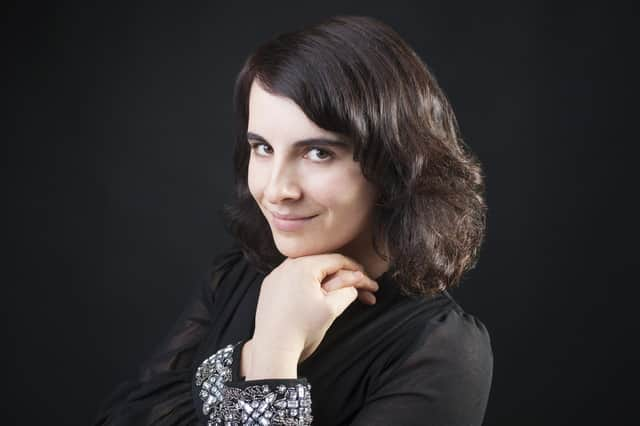REVIEW: Worthing Philharmonic Orchestra celebrate 75 years


The WPO at 75 – Worthing Philharmonic Orchestra concert at The Assembly Hall, Saturday 23 March (7.30). WPO (83 players): leader Preston Yeo, conductor/music director Dominic Grier, soloists Alissa Firsova piano (WPO president), Stuart Orme baritone. Worthing Choral Society (53 voices): MD, Aedan Kerney MBE; associate MD, Sam Barton. The Boundstone Chorus (55 voices): musical director, Aedan Kerney MBE; associate MD Mattea Leow.
Carl Maria von Weber, Overture to opera Der Freischütz; Ludwig van Beethoven, Piano Concerto No 5 in Eb ‘Emperor’ (encore: Rachmaninov, Prelude No 10 in Gb, Op23); Alissa Firsova (conducted Firsova), To Spring, for large orchestra and choir; William Walton, oratorio Belshazzar’s Feast.
Advertisement
Hide AdAdvertisement
Hide AdIntended glorification and some startling innovation being a child of necessity, plus artistic imagination, came multi-woven into a substantial anniversary celebration concert that was extraordinary even to customary expectations. First its scale, for a British provincial town: an orchestra of 83, two choirs totalling 107, four collaborating musical directors, one vocal soloist, and a concert pianist-composer-director doing all three. The 197 busiest personnel from Worthing’s most active classical music community included 117 women.
Secondly, the experience for everyone there should stay in the memory – for the things it wasn’t, that made it something even better than it was. The music intended to take its audience into the forest, then later confront it with a vision of Spring conducted by its composer – Alissa Firsova, the WPO president, after playing the Emperor – then shock with the declamation and shouts of these 107 voices and those 83 instruments, as another decadent leader of a civilisation bit the dust.
With war-making, international or domestic party-political, closing in around us, this wasn’t a set of musical works deliberately to mirror this. But if you don’t like weapons, armies, rulers, deity handwriting on the wall, assassination, rejoicing, then maybe look away now? Yes, I’m being a bit too graphic here, but great music as our faithful antidote isn’t all opium and balm. Sometimes it depicts unrest and conflict as well as decrying or bemoaning it. Sometimes it merely alludes to it. But it does not shut its eyes to violence, the great plague of human existence.
What WASN’T this concert? A conventional offering of classical music, listeners in rows all down the hall, each instrument in its usual place, soloists delivering the expected goods then bowing and disappearing, the audience saluting then vanishing.
Advertisement
Hide AdAdvertisement
Hide AdConfronting this audience was a hall floor half-covered by audience seating, HALF BY THE ORCHESTRA. Instead of the orchestra on stage were 107 choir seats, the Wurlitzer organ,and – what’s this? The Assembly Hall’s Steinway concert grand piano, glossily resplendent in its isolation, stood on its own stage tier, ABOVE and BEHIND the orchestra, in front of the choir. Shouldn’t it be at the front of the orchestra, surrounded by strings and under the conductor’s baton?
Not when the hired alternative grand piano is delivered the day before the concert, and is rejected as not up for the task. But when in the first place the in-house Steinway has no easy or affordable transportation route to reach the hall floor, and with no other suitable piano available at such short notice, WPO chairman David Holmes’s only-possible solution took on life. Its unconventional stage placing scared pianist Alissa Firsova and Dominic Grier, the WPO president and musical director. But first Grier, then Firsova, saw unforeseen advantage, and shared that with the orchestra.
“My first reaction was No Way!” confessed Firsova. “It was going to look like a flying circus-type thing, like performing on a floating stage. But I had no choice but to work with that, Dominic was very accommodating, and rehearsed with me the practicalities, alone by ourselves.
“And it turned out I could still see quite a lot of the orchestra, especially many of the strings even though the wind players and some of the cellos and violas in front of me had their backs to me. And the orchestra really liked it because they could hear the piano much more than normal. So I ended up really loving it, too.
Advertisement
Hide AdAdvertisement
Hide Ad“I had the advantage of being able to project the piano’s colours and harmonics, resonating through the stage and ringing across the extra space around it.”
Weber’s 19th century Der Freischütz Overture sets the forest scene for a contest between rural marksmen. Weber’s horns unfold misty mystery which then coloured my listening to their role in the following Emperor Piano Concerto. In both pieces the WPO showed their now-recognised rising mettle. This was the London-based Firsova’s fourth solo appearance with WPO.
She reported to me this. “As well as being a fine musician, Dominic [Grier] has a gift for orchestral training and is following in the footsteps of his Royal Academy teacher Colin Metters. It’s incredible what Dominic is doing with the Worthing Philharmonic, which I’ve noticed since I did Robert Schumann’s Piano Concerto with them eight years ago. He’s turning them into a professional orchestra and they are playing ever more exciting repertoire.
“Working with them is different, though. They are so nice and friendly. They’re not doing this because it’s their job, so there is more freedom to make the music you’re trying to make.”